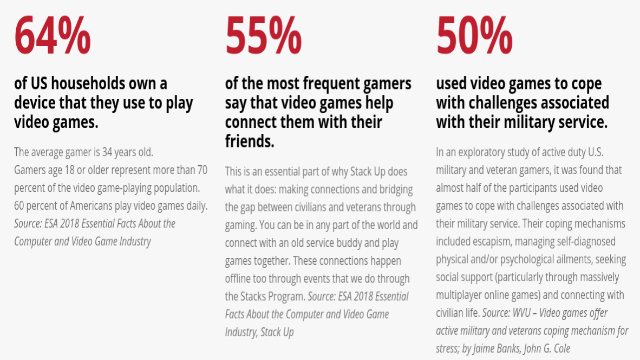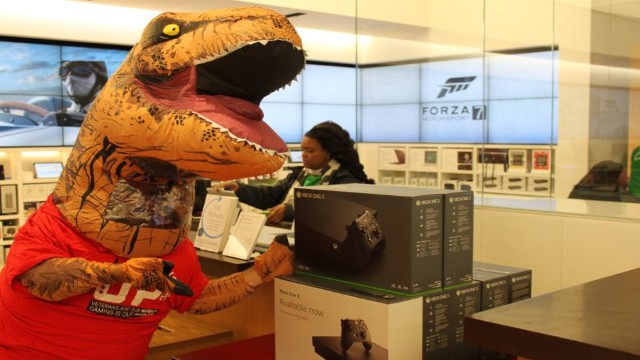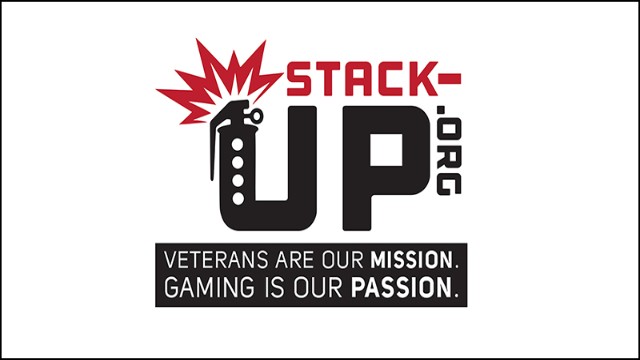While there are a lot of video games that revolve around war such as Battlefield, Call of Duty, Halo, and various others, often these games don’t educate players about the true cost of war and how it affects the lives of those who took part in it. Lately, video games have been getting better about showing this but what about real veterans? How have they been affected and how could video games help them? Studies have suggested that video games can help veterans deal with their mental health struggles and companies like Activision and Microsoft have been helping veterans with the power of video games for some time now.
Several mental health based video game charities have also become prominent is the last few years. Stack Up is one of these charities. Stack Up helps veterans at home, as well as soldiers overseas, with their mental health through gaming. At Twitchcon, I sat down with founder and CEO Stephen Machuga to learn more about the charity and its growth.
GameSkinny: Can you give us a quick rundown of Stack Up, what it does and its mission?
Stephen Machuga: Sure. Stack Up is a military charity for Veteran’s mental health through gaming and gaming communities. We have a variety of programs that we use to support that. We have our Supply Crates, where we box up games and gear, and we send them all around the world to veterans deployed in combat zones and others to military hospitals, as well as individuals who are struggling back home.
We have an Air Assault program that we use to help veterans fly out to various gaming events like studio tours, Comic-Con, E3, and things like that. We have our stacks program, which are community based volunteer efforts around the world, teams that get out and do good in their communities.
Then we have our Stackup Overwatch Program (StOP), which is our 24/7 peer-to-peer suicide prevention team on Discord, where veterans can come in and get some help that they need at all hours of the day. So those are our primary programs.
GS: You mentioned you help troops both overseas and here at home. What are some of the different difficulties that come with doing that, and what are the results you’ve seen from doing these programs like?
SM: We don’t really have that many difficulties. First off, it was filling the boxes and getting enough money to buy gear on the wishlist, so that involved working with publishers and developers to find the gear that we needed; but we’ve come a long way. Now we have partnerships with almost everybody on the block as far as the games industry goes.
We get new stories back … as far as individuals … asking for gear like that we say, “Hey, if we’re going to send you this stuff, could you please send us back some photos and some stories of you guys utilizing this?” And you get stories about individuals having tournaments at their unit wherever they are to determine who gets a day off or who gets to do what duties based on how they do in the tournament.
It’s a cool taste of home for these guys and gals that are in a place that feels as far away from home as you can possibly get.

GS: So can you tell me about the kind of things you do with those here and not overseas?
SM: That’s a big problem because when you’re in the thick of it, when you’re deployed forward and you’re doing it, whatever it is you’re doing, you don’t really think about it. But there’s a large contingent of veterans that are committing suicide because they’re Vietnam war vets. A lot of people are like, “Why did they wait so long (to get help)?”. Well, turns out that if you’re working 40 to 50 hours a week and doing your thing and then you retire, you have a lot of time on your hands to just sit there and think and process. They don’t have the tools in place to deal with their trauma. We’re trying to make sure we’re getting guys and gals that are younger and younger age through gaming, we’re trying to raise morale, we’re trying to make them feel more at home wherever they’re at. And then back home, guys and gals who need help here, we’re also making sure we’re taking care of them.
You hear all kinds of stories about people who don’t have enough money. They’re living on disability, and they don’t have enough money for gaming and it becomes a luxury item. It’s tough to say, “Hey, this is an Xbox and some games as a medical necessity,” but it very much can be.
One of the key indicators of somebody who’s suicidal is somebody who’s disconnected from the outside world. They don’t feel that they’re a part of anything. And multiplayer gaming is one of those things where you have a group of people who may not have served in the military but speak that gaming language. It helps you feel like you’re part of something bigger, which many veterans feel when they’re in the military.
GS: What are some of your hopes for the future of Stack Up?
SM: Just growing it out. Obviously, everybody we tell what it is we do, they love what we do, and they think we’re amazing. And then they walk off. We need to make sure we’re getting to the point where we’re reaching the people who can make a difference in growing out our organization.
There’s no venture capital, and there’s no shark tank that’s going to say, “Hey, this is a great charity idea; I want to invest money into it.” Because it’s about getting a return on investment, so we need to find individuals with deep pockets and that love philanthropy to help get this thing from a half million dollars a year to where we’re competing with some of the bigger charities.
That’s the goal right now. We get larger, we’re not going anywhere, we’re not worried about keeping the lights on, we can do more, we can help more people, and it doesn’t become this hand-to-mouth existence that we’re living with. So we can do more if we’re secure.
GS: Can you tell me about what you have at your booth here at TwitchCon?
SM: Yeah, we used to have a push-up competition at our booth and it became kind of problematic. So now we have this high striker (example pictured below). Ironically, a lot of our veterans who are helping man the booth are sensitive to loud noises they aren’t expecting, so there’s a bit of a problem with that but it’s a learning experience.


GS: Can you tell me about the dinosaur mascot that’s all over your booth?
SM: Yeah, so one of our first conventions, one of our volunteers and community members got a T-Rex outfit, and we threw a T-Shirt on him and started walking him around at conventions and the response we got from people, they were taking pictures with it and using social media to make noise about it. We thought we were on to something. So it became our official mascot: Stack Up Rex.
GS: What is the logo for Stack Up, and why was it chosen?
SM: Obviously, the logo wording is “Stacked Up” on each other. The “grenade” is a flashbang, a non-lethal explosive device used for breaching buildings and disorienting enemy forces. A “Stack” is a formation used by a fire team to enter a building where enemy forces are believed to be inside. The flashbang is used after the door is breached to stun everyone inside, making entry easier.
Those interested in learning more about Stack Up can visit their website. For those who would like to help out with the charity’s efforts, they can either donate or volunteer.








Published: Oct 4, 2019 10:31 am